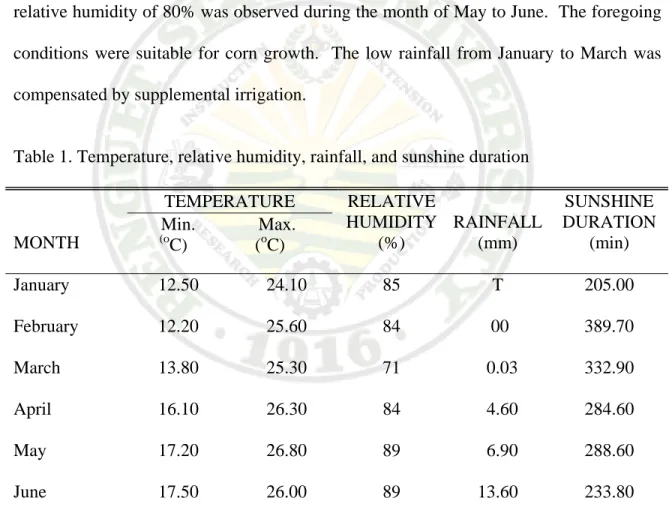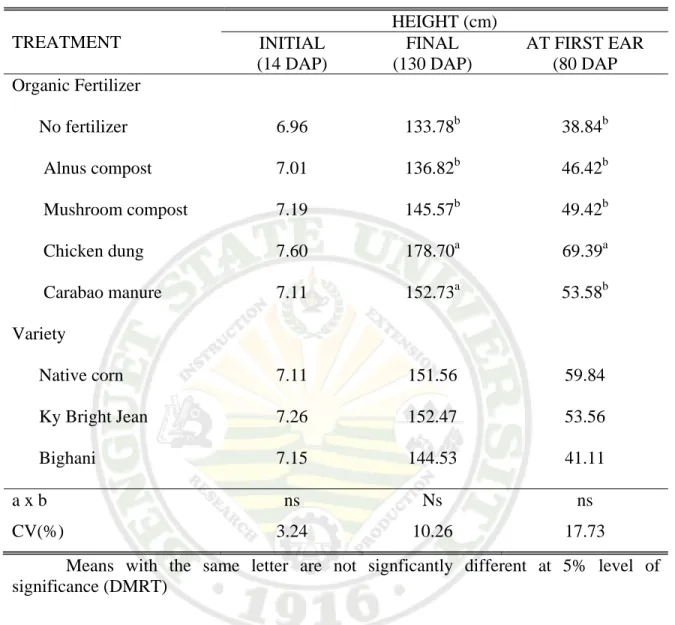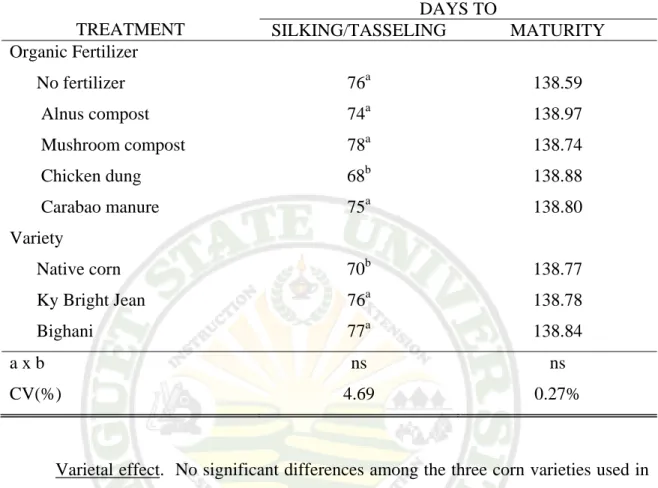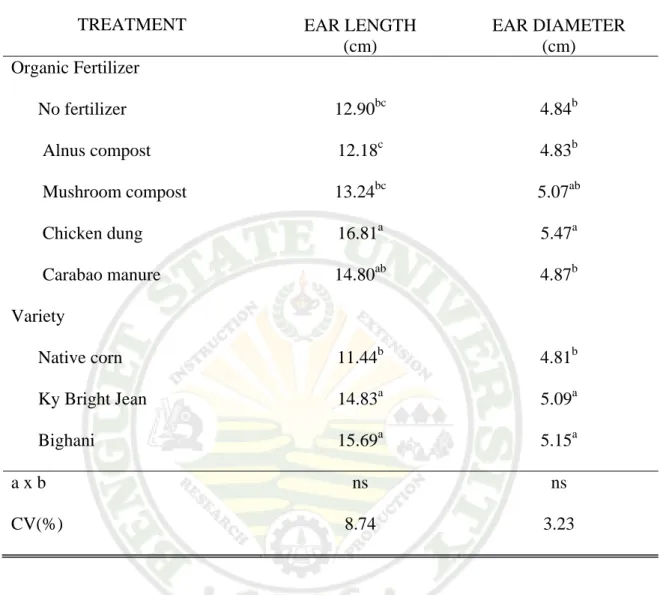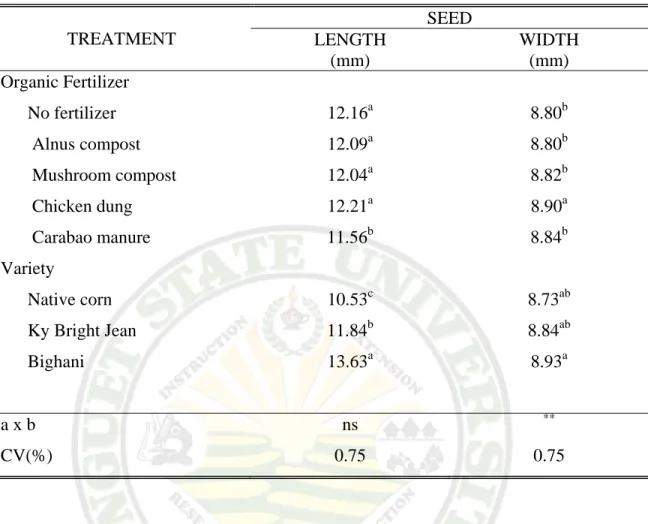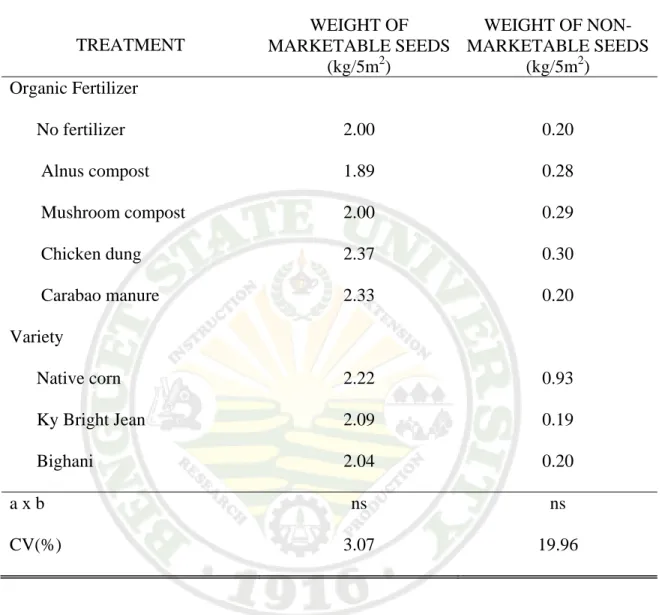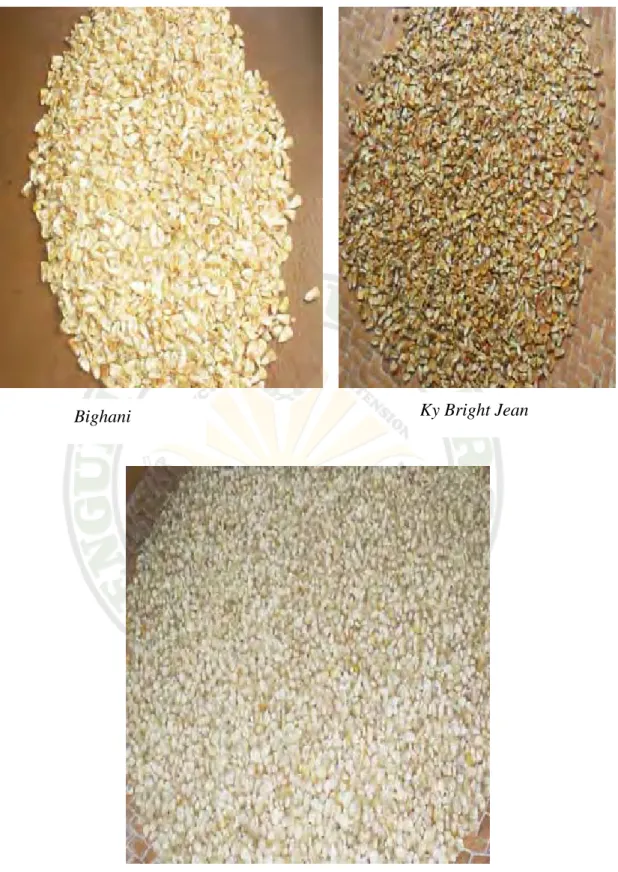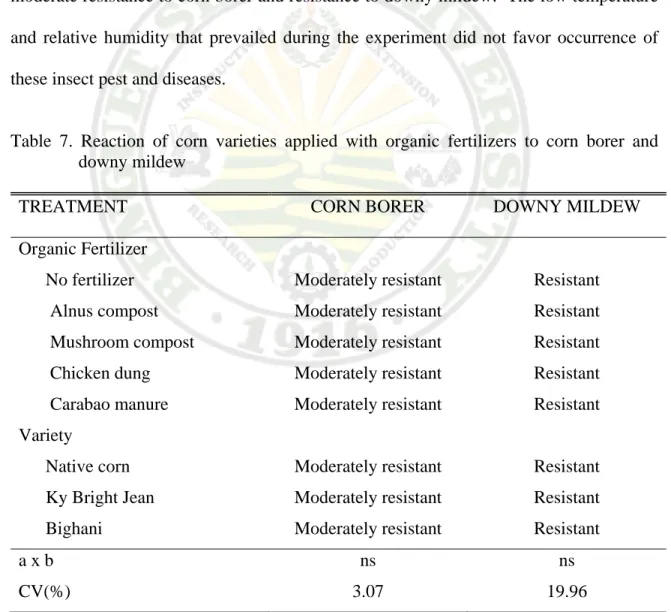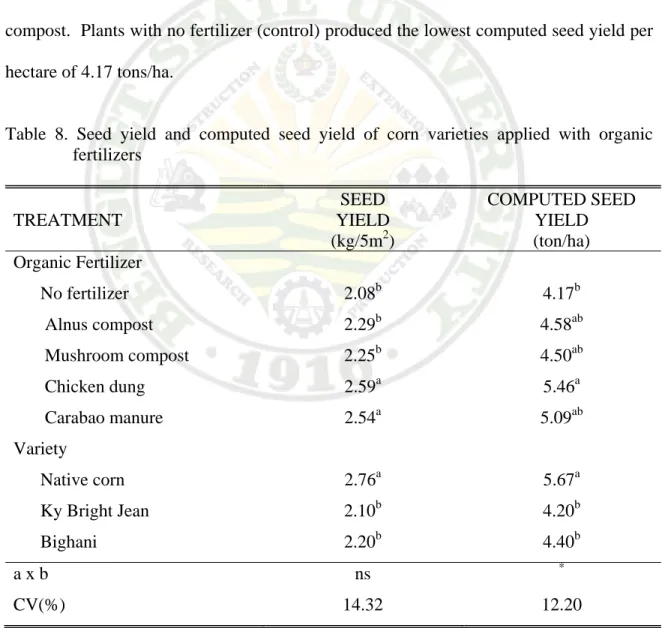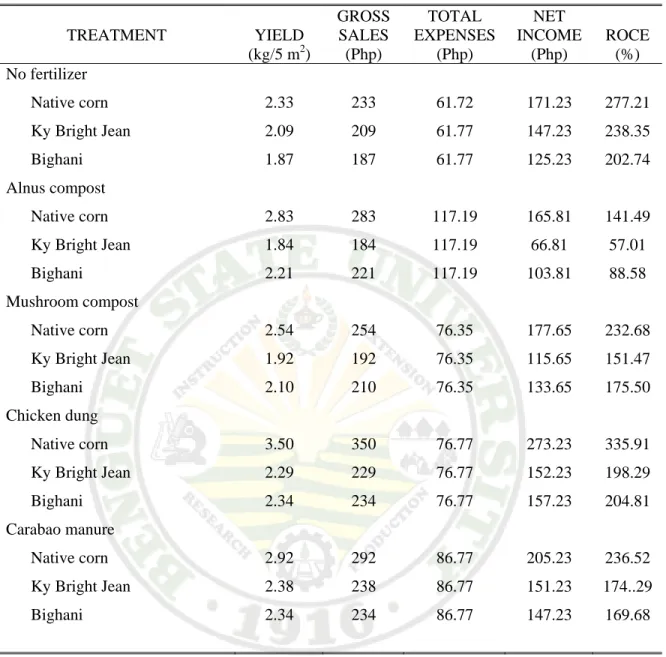LIGAW, GREGORIO L. APRIL 2012. Growth and Seed Yield of Three Corn Varieties Applied with Organic Fertilizers under La Trinidad, Benguet Condition.
Benguet State University, La Trinidad, Benguet.
Adviser: Danilo P. Padua, PhD.
ABSTRACT
The study was conducted at BSU Experimental area, Balili, La Trinidad, Benguet from January to June 2010 to evaluate the growth and seed yield of different corn varieties; determine the best organic fertilizer that could give improvement on seed yield in corn, determine the best combination of corn variety and organic fertilizer on seed production, and determine the economic benefits of producing corn applied with different organic fertilizers.
Chicken dung and carabao manure promoted higher corn seed yield. Among the three varieties tested, native corn was best performing in terms of growth, marketable seed yield and total yield under La Trinidad, Benguet condition.
Native corn applied with chicken dung produced the highest yield and profit under La Trinidad, Benguet condition.
Page
Bibliography. . . . i
Abstract . . . i
Table of Contents . . . ii
INTRODUCTION . . . . . 1
REVIEW OF LITERATURE . . . 3
MATERIALS AND METHOD . . . . . . 8
RESULTS AND DISCUSSION . . . . . . 12
Meteorological Data . . . 12
Initial Plant Height . . . 13
Final Plant Height . . . 13
Plant Height at First Ear . . . 13
Days from Sowing to Emergence andSilking/Tasseling . . . 15
Days to Silking and Tasseling. . . 15
Days to Maturity . . . 15
Corn Ear Length . . . 16
Corn Ear Diameter . . . . . 18
Seed Length . . . 18
Seed Width . . . 19
Weight of Marketable Seeds . . . 20
Weight of Non-marketable Seeds . . . 21
Reaction to Corn Borer and Downy Mildew . . . . . . 24
Computed Yield per Hectare . . . . . . 25
Total Weight of Seeds per Plot . . . 27
Return on Cash Expenses . . . 27
SUMMARY, CONCLUSIONS AND RECOMMENDATIONS . . . 29
Summary . . . 29
Conclusions . . . 30
Recommendations . . . 30
LITERATURE CITED . . . . . . . 31
APPENDICES . . . . . . 33
INTRODUCTION
Corn is second to rice in importance as a staple food (PCARRD, 1970). Corn grains are milled into corn grits and prepared as food for steaming like rice. It is also processed into flakes, oil, syrup and popcorn as well as a coffee substitute (Gagni and Tabinga, 1985).
In the Philippines highlands particularly in Benguet, Sweet corn and native corn are produced as cash crops among the farmers. Farmers usually use different kinds of corn varieties from their own previous crop (Mamuri, 2003).
At the present, the problem faced by the farmers is the high cost of chemical fertilizers. This situation greatly increases the farmer’s investment in production. In view of this, the use of organic fertilizers appears to be very logical alternative in minimizing chemical or organic fertilizer inputs (Mamuri, 2003).
The use of organic fertilizers in corn production can lessen the expenses of farmers and ensure the vigorous growth of plants. It also influences nutrient absorption due to its role in granulation and improvement of the physical and chemical properties of the soil (Tamiray, 1997).
In addition, this study may serve as a useful guide for farmers engaged in corn production. It can lead to the production of high quality corn seeds which ensures increased production. Evaluation of different corn varieties may also lead the farmers to have other alternative corn varieties to plant.
The study was conducted to:
1. evaluate the growth and seed yield of different corn varieties under La Trinidad, Benguet condition;
2. determine the best organic fertilizer material that could promote vegetative growth and improve seed yield of corn;
3. determine the best combination of corn variety and organic fertilizers on seed production; and
4. determine the economic benefits of producing corn applied with different organic fertilizers.
The study was conducted at the Benguet State University Experimental Area, Balili, La Trinidad, Benguet from December 2009 to June 2010.
REVIEW OF LITERATURE
Soil and Climatic Requirements
Corn grows best on fertile, well-drained, clay loamy soil rich in humus and organic matter. However, if the field is not suitable for corn production, apply proper fertilizers and organic matter. Also we plant legumes such as mungbean, peanut, and peas to improve the fertility of soil. The soil at least 80 cm deep soil holds moisture and provides the needed nutrients for the plants. Corn grows well in a field that is slightly rolling and fairly deep such topography will minimize stagnant water in the field (Gagni and Tabinga, 1985).
Baluyot, et al. (1984) reported that corn is best adapted to well drained loamy soil with high organic matter and water holding capacity. It requires a pH ranging from 5.5 (rather acidic) to 8.0 (moderately) for the best production of corn.
Seed Production and Varietal Evaluation
According to Coscolan (1991), the proper selection of variety of corn to be planted is very necessary to increase its yield potential and the income of the farmers. In addition, varietal evaluation is necessary to observe the characters such as yield, earliness, maturity and keeping quality because varieties have a wide range of differences is size-yielding performance.
Reily and Shry (1991) reported that corn varieties must be adapted to the area in which it is grown; there is a great variation in the yielding ability of the different varieties when grown under the same method of culture. A variety that yields well in one region is
not a guarantee that it will perform well in another region.
Adaptability of crop in the highlands differs relatively to elevation mainly because of temperature as well pest and diseases prevalence (SEARCA, 2002).
Therefore, farmers must know if a variety can grow suitably in that particular area.
Corn Fertilization and Irrigation
Baluyot and Cox (1984) stated that to attain best yield of a variety, all the required nutrients must be available for the growth of corn plants. The amount of fertilizers recommend to apply is determined by the level of nutrient present in the soil. In most cases, nitrogen fertilizers is very important to produce high yield. A yield of 5-6 tons per hectare can be obtained in farmers field fertilized with 90-100 kg tons per hectare of nitrogen.
They further recommend basal application and side dressing of fertilizer during wet season. They recommend application of half of the recommend nitrogen and all the phosphorus 205 and potassium 20 in the furrows with 2-3 cm soil before planting.
According to Quilloy (1993), one important factor that affects corn yield is nitrogen fertilizers. Using high rates of fertilizers with adequate population will not increase yield unless there is sufficient supply of nutrients.
Fertilizers Requirement
Manure contains many essential plant nutrients especially phosphorous, potassium, calcium, magnesium, sulfur, zinc and others. Farm manure influences the soil as a nutrient and tends to increase crop yield and granulation that binds or lighten and expand soil aggregates making the soil porous. Corn varieties respond very well to nitrogen fertilizers (Banario, 1998).
Importance of Organic Fertilizers on the Soil
At present, farmers have many farm problems. One of which is low yield, thus farmers keeps figuring out ways to improve production and high profit. This can be realized by encouraging them to observe and keep environment-friendly practices such as the use of organic fertilizers (Javar, 2005).
Organic fertilizers generally provide many advantages to the farmers in terms of soil improvement and conservation, good yields and high quality of produce. This ensures reduction of production cost in the long run (Salda, 1999).
Tomilas (1996) reported that application of organic fertilizers in sufficient amount improves soil structure, serves to improve organic matter of the soil and increase not only the quality of nutrient elements for plant growth and development but also decrease bulk density of the soil. Organic matter in the soil can increase ware absorption and lesser water run-off leaching and erosion.
Pointcelot (1986) stated that organic farming is very important in improving soil fertility and replacing the costly inorganic fertilizers. The organic residues are easily available from decomposed weeds, straws and alnus compost. The fibrous portion of the organic matter improves the soil physical properties. Its loose property and high carbon content promote soil aggregation and improve the permeability and aeration of clay soils.
Their high humus content granulates sandy soils and improved their nutrients and water holding capacity. Moreover, carbon in organic matter is the main source of energy for activity of soil microorganisms like rhizobia for nitrogen fixation and mycorrhizae for increasing the soil phosphorous content.
Effect of Organic Fertilizers
Organic materials effects on the soil are strongly influenced by the nature, their nutrient content, and the process of their decomposition in the soil. They increase soil fertility, balanced supply of nutrient and build up of organic matter. There is a diverse array of organic materials, which can be processed and composted for application in the farm. Most of these are known wastes but some are by-products that can be put to good use by simple processes or treatment such as composting (PCARRD, 2006).
Daoines (1994) stated that adding and returning organic matter to the soil is essential. It is only organic matter that can provide the necessary element for growing plants. The amount of humus in the soil decreases through mineralization, thus resupplying lost humus every year is a must for maintaining soil fertility and quality.
Approximately eight tons convert to hectare, organic matter a year necessary for this purpose. To improve quickly the chemically spoiled soil, an initial addition of double this amount (16 tons/ ha) is recommended. Also applying animal manure improves the structures of the soil. This may be due to the presence of nutrient element in the organic matter. Also mentioned that C: N ratio may indicate the availability of N in organic
matter since the lower C: N ratio the better is the availability of nitrogen. . Eslay (1996) reported that application of chicken dung enhanced the growth of
potato plants. She further explained that crops applied with chicken dung on basal had the highest marketable tubers and total weight compared with other fertilizers. This superiority of chicken dung may be attributed to more nutrients, and readily available nutrients and combination of both. Also, Bilango (1996) found that potato plants applied with organic fertilizers produce best yields.
Pandosen (1980) claimed that the application of organic matter effectively improve the physical properties of the soil decreased the bulk density of the soil which favored plant growth.
Application of Compost
Compost is commonly regarded as a soil amendment as well as a fertilizer by improving soil physical properties and promoting the growth of soil found compost may have beneficial effect goes beyond the nutrients it provides (Mamuri, 2003).
MATERIALS AND METHODS
An area of 225 m2 was properly cleaned and prepared. The area was divided into three blocks to accommodate 45 plots with dimensions of 1 m x 5 m each. The experiment was laid out following 3x5 factorial in Randomized Complete Block Design with three replications. The different varieties served as factor A, and the different organic fertilizers served as factor B.
. The treatments were the following:
Factor A: Organic Fertilizers (OF) O1= No fertilizers
O2= Alnus compost O3= Mushroom compost O4= Chicken dung (5tons/ha) O5= Carabao manure (5 tons/ ha) Factor B: Varieties (V)
V1 = Native corn V2 = KY Bright Jean V3 = Bighani
Planting was done in single row with the seeding rate of two seeds per hill at a distance of 50 cm between rows and hills.
To ensure good growth and yield, cultural management practices such as weeding, hilling-up, irrigation, disease and pest control were properly observed.
Data Gathered
1. Agro-climatic data. Temperature, relative humidity, sunshine duration and rainfall amount was taken during the conduct of the experiment from Philippine (PAG- ASA) station, La Trinidad, Benguet.
2. Days from sowing to emergence. This was recorded when at least 50% of the seeds emerged.
3. Days from emergence to silking/tasseling. This was recorded when at least 50% of the plant per plot have extended tassel and silk.
4. Days from emergence to maturity. This was recorded by counting the number of days from emergence to harvesting of dried ears.
5. Initial plant height (cm). This was measured from the base of the plant at ground level to the tip of the youngest shoots, using ten samples per plot one week after emergence.
6. Final plant height (cm). This was measured from the base of the plant at ground level to the youngest shoot before harvesting using ten samples per plot.
7. Height of plants at first ear (cm). This was taken by measuring the base of the plant up to the base of the first ear one week after ear emergence.
8. Length of corn ear (cm). This was recorded by measuring ten sample ears per plot selected at random measured from the base to the tip using foot rule.
9. Ear diameter (cm). This was gathered by measuring ten sample ears per plot using vernier caliper.
10. Seed width (mm). Seed width was taken by measuring the mid portion of seed using a vernier caliper.
11. Seed length (mm). This was obtained by measuring the seed parallel to the hilum.
12. Seed color. This was taken using visual observation.
13. Weight of marketable seeds/plot (kg). This was obtained by weighing the marketable seeds. Marketable seeds are good and smooth, well-formed seeds and free from damages.
14. Weight of the non-marketable seeds/plot (kg). This was obtained by weighing all the damaged seeds, small sized, malformed and damaged by diseases.
15. Computed seed yield per ha (kg). This was obtained by weighing the seeds per
plot into hectare basis using ratio and proportion:
Yield/ton/h = Total yield per plot x 2
16. Pest and disease reaction. This was assessed by rating the degree of disease and insect damage on the crop.
a. Reaction to corn borer. The reaction to the damage of corn borer on the different varieties was evaluated using the following scale:
Rating Description Remarks
1 Less than 1% damaged Highly resistant 2 1-5% damaged Moderately resistant 3 6-10% damaged Resistant
4 11-20% damaged Susceptible 5 21-30% damaged Very susceptible
b. Reaction to downy mildew. Occurrence of downy mildew in each variety was obtained by using this formula:
% Infection Index = No. of Plants Infected/Plot x 100 Total No. of Plants/Plot
Rating Description Remarks
1 No infected or less than 10% Resistant
2 10% of plant infected Moderately resistant 3 11-50% of plant infected Susceptible
4 5% or nearly all the plants infected Highly susceptible
17. Return on cash expenses. This was computed by subtracting the total
expenses from the gross sales divided by the total expenses multiplied by 100 as follows:
ROCE (%) = Gross Sales - Total Expenses x 100 Total Cost of Production
Analysis of Data
All the quantitative data measured in this study were statistically analyzed using 3x5 factorial in Randomized Complete Block Design (RCBD) with three replications. The significance of difference among treatment means was tested using Duncan`s Multiple Range Test (DMRT) at 5% level of significance.
RESULTS AND DISCUSSION
Meteorological Data
The monthly temperature, relative humidity, amount of rainfall, and light throughout the conduct of the study are shown in Table 1. It was observed that the minimum temperature (12.20oC) was noted during the month of February, while the maximum temperature of 26.80oC was observed in the month of May. The minimum relative humidity of 71% was observed in the month of March while the maximum relative humidity of 80% was observed during the month of May to June. The foregoing conditions were suitable for corn growth. The low rainfall from January to March was compensated by supplemental irrigation.
Table 1. Temperature, relative humidity, rainfall, and sunshine duration
MONTH
TEMPERATURE Min. Max.
(o
C) (oC)
RELATIVE HUMIDITY
(%)
RAINFALL (mm)
SUNSHINE DURATION
(min)
January 12.50 24.10 85 T 205.00
February 12.20 25.60 84 00 389.70
March 13.80 25.30 71 0.03 332.90
April 16.10 26.30 84 4.60 284.60
May 17.20 26.80 89 6.90 288.60
June 17.50 26.00 89 13.60 233.80
Source: PAGASA Station, BSU, La Trinidad Benguet
Initial Plant Height
Effect of organic fertilizers. Table 2 also shows the initial height of corn plant as affected by the application of different organic fertilizers. Statistically, no significant differences were observed on the height of the two corn varieties applied with different organic fertilizers at one week after emergence.
Varietal effect. Statistical analysis revealed no significant differences among the three corn varieties at one week after planting. Plant height varies with variety (IRRI, 2003) and is governed by a number of genes (Ashikari et al., 2005). Differences between varieties may be due mainly to genetic attributes thus, the varieties could be genetically similar with respect to plant height.
Interaction effect. No significant interaction effect of organic fertilizers and corn varieties were noted on the initial plant height of corn.
Final Plant Height
Effect of organic fertilizers. Table 2 shows the height of corn plant as affected by the application of organic fertilizers. Significant differences among the organic fertilizers used were observed. Plants applied with chicken dung and carabao manure were the tallest.
Varietal effect. It was observed that Ky Bright Jean and native corn were taller than Bighani indicating that the latter maybe less adapted than the other two varieties under La Trinidad condition.
Interaction effect. No significant interaction was observed among the corn varieties and organic fertilizers on the final plant height of corn (Table 2).
Table 2. Initial and final height and height of plant at first ear of corn varieties applied with organic fertilizers
TREATMENT
HEIGHT (cm) INITIAL
(14 DAP)
FINAL (130 DAP)
AT FIRST EAR (80 DAP Organic Fertilizer
No fertilizer Alnus compost Mushroom compost Chicken dung Carabao manure Variety
Native corn Ky Bright Jean Bighani
6.96 7.01 7.19 7.60 7.11
7.11 7.26 7.15
133.78b 136.82b 145.57b 178.70a 152.73a
151.56 152.47 144.53
38.84b 46.42b 49.42b 69.39a 53.58b
59.84 53.56 41.11 a x b
CV(%)
ns 3.24
Ns 10.26
ns 17.73
Means with the same letter are not signficantly different at 5% level of significance (DMRT)
Plant Height at First Ear (cm)
Effect of organic fertilizers. Significant differences among the organic fertilizers were observed on the plant height at first ear.
Varietal effect. No significant differences were observed on height at first ear (59.84 cm).
Interaction effect. No significant interactions were observed between the corn varieties and organic fertilizers on the height of the first ear (Table 2).
Days from Sowing to Emergence
Effect of organic fertilizers. Organic fertilizers did not significantly affect the emergence of corn plants.
Varietal effect. All the corn varieties emerged 8 days after planting.
Days to Silking and Tasseling
Effect of organic fertilizers. Table 3 shows the days to silking and tasseling as affected by organic fertilizers. Highly significant differences were observed among the treatments on the days to silking and tasseling. Plants applied with chicken dung tasseled and silked 68 days after planting (DAP) which was 6-10 days earlier than the others.
This could be due to the relatively high nitrogen content of chicken dung (3.8%) based on the source of nutrient as cited by Tacon (1987).
Varietal effect. Among the three varieties of corn tested, native corn showed earlier tasseling and silking by about 6 days over the other varieties (Table 3). This could be attributed to varietal characteristics of the plants evaluated. The native corn seem to be earlier maturing than the two other varieties when grown under warm temperature.
Interaction effect. No significant interaction effect of the corn variety and fertilizer on the days to tasseling and silking of corn was observed, although the widest difference between combinations was more than 2 weeks.
Days to Maturity
Effect of organic fertilizers. There were also no significant differences observed on the number of days from planting to maturity among the organic fertilizers used.
Table 3. Days to silking/tasseling and to maturity of corn varieties fertilized with organic fertilizer
TREATMENT
DAYS TO
SILKING/TASSELING MATURITY Organic Fertilizer
No fertilizer Alnus compost Mushroom compost Chicken dung Carabao manure Variety
Native corn Ky Bright Jean Bighani
76a 74a 78a 68b 75a
70b 76a 77a
138.59 138.97 138.74 138.88 138.80
138.77 138.78 138.84 a x b
CV(%)
ns 4.69
ns 0.27%
Varietal effect. No significant differences among the three corn varieties used in the study were revealed. All varieties matured in 138 to 139 days.
Interaction effect. No significant interaction was observed among the corn varieties and organic fertilizer.
Corn Ear Length
Effect of organic fertilizers. Corn ear length as affected by the different fertilizers is shown in Table 4. Highly significant differences among the treatments were observed.
Plants applied with chicken dung produced longer ear than those plants applied with other fertilizers. Chicken dung presumably contain a good balance of nutrients suitable for earlier silking/tasseling as well as enhancing longer and bigger ears in corn.
Table 4. Ear length and ear diameter of corn varieties applied with organic fertilizers
TREATMENT EAR LENGTH
(cm)
EAR DIAMETER (cm) Organic Fertilizer
No fertilizer Alnus compost Mushroom compost Chicken dung Carabao manure Variety
Native corn Ky Bright Jean Bighani
12.90bc 12.18c 13.24bc
16.81a 14.80ab
11.44b 14.83a 15.69a
4.84b 4.83b 5.07ab
5.47a 4.87b
4.81b 5.09a 5.15a a x b
CV(%)
ns 8.74
ns 3.23
Varietal effect. Highly significant differences were observed on the ear length of the different corn varieties. Bighani produced longer corn ears than native corn but was similar to Ky Bright Jean (Table 4). Bighani appear to have actually better potential under cool conditions despite of its lower stature.
Interaction effect. No significant interaction was observed between the corn varieties and organic fertilizers (Table 4).
Corn Ear Diameter
Effect of organic fertilizers. Table 4 shows the diameter of corn ear as affected by different organic fertilizers. Plants applied with chicken dung recorded the highest ear diameter of 5.47 cm. Plants applied with mushroom compost produced mean diameter of 5.07 cm. The narrowest ear diameter of 4.83 cm was obtained from the plants applied with Alnus compost.
Varietal effect. Among the three corn varieties evaluated, it was observed that Bighani and Ky Bright Jean varieties produced significantly wider corn diameter than Native corn, indicating the latter is much smaller than the other two varieties.
Interaction effect. No significant interaction effect was noted on corn ear diameter (Table 4).
Seed Length
Effect of organic fertilizers. The seed length of corn varieties as affected by organic fertilizers is shown in Table 5. It revealed highly significant differences among the treatments. Plants applied with chicken dung produced longer seeds than those plants applied with other fertilizers. The shortest seed length was obtained from the plants applied with carabao manure. This result further emphasizes the advantage of chicken dung over the other organic fertilizers when applied to corn.
Varietal effect. Statistical analysis showed that Bighani variety produced significantly longer seeds than the other varieties followed by Ky Bright Jean which has also longer seeds than the Native corn (Table 5).
Table 5. Length and width of seeds of corn varieties applied with organic fertilizers
TREATMENT
SEED LENGTH
(mm)
WIDTH (mm) Organic Fertilizer
No fertilizer Alnus compost Mushroom compost Chicken dung Carabao manure Variety
Native corn Ky Bright Jean Bighani
12.16a 12.09a 12.04a 12.21a 11.56b
10.53c 11.84b 13.63a
8.80b 8.80b 8.82b 8.90a 8.84b
8.73ab 8.84ab 8.93a
a x b CV(%)
ns 0.75
**
0.75
Interaction effect. Variations among the interactions ranged from 10.50 mm to 13.90 mm but such variations were not sufficient to effect significant differences (Table 5).
Seed Width
Effect of organic fertilizers. Table 5 shows the seed width of corn varieties as affected by different organic fertilizers. Plants applied with chicken dung recorded the biggest seed width of 8.90 mm. The lowest width of 8.80 mm was obtained from the plants applied with Alnus compost and control or no fertilizer.
Varietal effect. Statistical analysis showed that Bighani variety produced significantly wider seeds with 8.93 mm, while the native corn has the smallest seeds with 8.73 mm. In terms of characteristic of seeds, Native corn seeds are smaller than the seeds of the sweet corn (Table 5).
Interaction effect. Highly significant interaction between variety and fertilizers on the seed width of corn was noted (Figure 1). Bighani applied with chicken dung had the widest seeds.
Figure 1. Seed width of corn varieties applied with organic fertilizers Variety
Weight of Marketable Seeds
Effect of organic fertilizers. Highly significant differences were observed on the weight of marketable corn seeds. Plants applied with mushroom compost, chicken dung compost and carabao manure have comparable weights and they were markedly greater than those applied with alnus compost. Based on the source of nutrient, the different organic fertilizers like the mushroom compost, chicken dung compost and carabao manure had a high nutrient content than alnust compost.
Varietal effect. Based on the statistical analysis, significant differences were observed on the weight of marketable corn seeds. Native corn variety produced significantly heavier marketable seeds weighing 2.23 kg/plot followed by Ky Bright Jean varieties weighing 2.09 kg/plot (Figure 2). Bighani varieties had produced lighter marketable corn seeds per 5 m2 per plot. Significant differences were observed on the weight of marketable corn seeds from the three corn varities studied (Table 6).
Interaction effect. No significant interaction between corn varieties and organic fertilizers used in the study was observed on weight of marketable seeds of corn.
Weight of Non-marketable Seeds
Effect of organic fertilizers. Plants applied with different organic fertilizers produced significant variations in terms of non-marketable seeds per 5m2 plot (Table 6).
Plants applied with alnus compost, mushroom compost, chicken dung compost and carabao manure have comparable weights.
Varietal effect. Ky Bright Jean produced the least non-marketable seeds. The native corn produced significantly heavier non-marketable seeds weighing 0.39 kg/plot followed by Bighani weighing 0.20 kg/plot.
Table 6. Weight of marketable and non-marketable seeds per plot applied with organic fertilizers
TREATMENT
WEIGHT OF MARKETABLE SEEDS
(kg/5m2)
WEIGHT OF NON- MARKETABLE SEEDS
(kg/5m2) Organic Fertilizer
No fertilizer Alnus compost Mushroom compost Chicken dung Carabao manure Variety
Native corn Ky Bright Jean Bighani
2.00 1.89 2.00 2.37 2.33
2.22 2.09 2.04
0.20 0.28 0.29 0.30 0.20
0.93 0.19 0.20 a x b
CV(%)
ns 3.07
ns 19.96
Interaction effect. No significant interaction effect between the corn varieties and organic fertilizers were noted on the weight of non-marketable seeds. This indicates that organic fertilizers did not significantly interact in terms of weight of non-marketable seeds of the different corn varieties. It ranged from 0.16 kg/5m2 to 0.58kg/5m2 per plot.
Figure 2. Seeds of the three corn varieties applied with organic fertilizers
Bighani Ky Bright Jean
Native corn
Reaction to Corn Borer and Downy Mildew
Effect of organic fertilizers. Plants applied with different organic fertilizers did not vary from each other. All plants showed moderate resistance indicating that all organic fertilizer used could actually be used to partly prevent the occurrence of corn borer and downy mildew.
Varietal effect. All three corn varieties did not significantly differ from each other in terms of resistance to corn borer and downy mildew. The three varieties exhibited moderate resistance to corn borer and resistance to downy mildew. The low temperature and relative humidity that prevailed during the experiment did not favor occurrence of these insect pest and diseases.
Table 7. Reaction of corn varieties applied with organic fertilizers to corn borer and downy mildew
TREATMENT CORN BORER DOWNY MILDEW
Organic Fertilizer No fertilizer Alnus compost Mushroom compost Chicken dung Carabao manure Variety
Native corn Ky Bright Jean Bighani
Moderately resistant Moderately resistant Moderately resistant Moderately resistant Moderately resistant
Moderately resistant Moderately resistant Moderately resistant
Resistant Resistant Resistant Resistant Resistant
Resistant Resistant Resistant a x b
CV(%)
ns 3.07
ns 19.96
Interaction effect. No significant interaction effect on both varieties and organic fertilizers used was observed.
Computed Yield per Hectare
Effect of organic fertilizers. Statistical analysis showed highly significant differences on computed yield per hectare among plants applied with organic fertilizers.
Plants applied with chicken dung gave the highest computed seed yield of 5.458 tons/ha.
It was followed by plants applied with carabao manure, alnus compost and mushroom compost. Plants with no fertilizer (control) produced the lowest computed seed yield per hectare of 4.17 tons/ha.
Table 8. Seed yield and computed seed yield of corn varieties applied with organic fertilizers
TREATMENT
SEED YIELD (kg/5m2)
COMPUTED SEED YIELD (ton/ha) Organic Fertilizer
No fertilizer Alnus compost Mushroom compost Chicken dung Carabao manure Variety
Native corn Ky Bright Jean Bighani
2.08b 2.29b 2.25b 2.59a 2.54a
2.76a 2.10b 2.20b
4.17b 4.58ab 4.50ab 5.46a 5.09ab
5.67a 4.20b 4.40b a x b
CV(%)
ns 14.32
*
12.20
Varietal effect. Statistical analysis revealed no significant differences on the computed seed yield per hectare. Native corn produced the highest yield followed by Bighani and Ky Bright Jean. The lowest computed yield per hectare of 4.20 tons and 4.40 tons was obtained from Ky Bright Jean and Bighani varieties (Table 8).
Interaction effect. It was observed that there was a significant interaction effect of varieties and different fertilizers used on the computed seed yield per hectare (Figure 3).
Native corn applied with chicken dung significantly interacted in terms of seed yield.
Figure 3. Computed seed yield per hectare (tons) of corn varieties applied with organic fertilizers
Total Weight of Seeds per Plot
Effect of organic fertilizers. Plants applied with chicken dung produced the heaviest weight of corn seeds per 5m2 but was statistically comparable with other varieties except the plants with no fertilizer or control which had the lightest corn seeds.
Varietal effect. The weight of seed corn per 5 m2 plot shows that Native corn produced significantly heavier seed than the other varieties. This is due to characteristic of native corn which has heavier weight compared to other seeds.
Interaction effect. The three corn varieties tested and the different fertilizers used did not significantly interact on the total weight of corn seeds per plot.
Return on Cash Expenses
Table 9 shows the cost and return analysis of three corn varieties applied with organic fertilizers under La Trinidad condition.
Carabao manure had the highest ROCE among the other organic fertilizers used in the study. The three corn varieties applied with chicken dung had the highest ROCE among other organic fertilizers used in the study based on ROCE.
Table 9. Return on cash expenses of three corn varieties applied with organic fertilizers
TREATMENT YIELD
(kg/5 m2)
GROSS SALES (Php)
TOTAL EXPENSES
(Php)
NET INCOME
(Php)
ROCE (%) No fertilizer
Native corn Ky Bright Jean Bighani Alnus compost Native corn Ky Bright Jean Bighani
Mushroom compost Native corn Ky Bright Jean Bighani Chicken dung Native corn Ky Bright Jean Bighani Carabao manure Native corn Ky Bright Jean Bighani
2.33 2.09 1.87
2.83 1.84 2.21
2.54 1.92 2.10
3.50 2.29 2.34
2.92 2.38 2.34
233 209 187
283 184 221
254 192 210
350 229 234
292 238 234
61.72 61.77 61.77
117.19 117.19 117.19
76.35 76.35 76.35
76.77 76.77 76.77
86.77 86.77 86.77
171.23 147.23 125.23
165.81 66.81 103.81
177.65 115.65 133.65
273.23 152.23 157.23
205.23 151.23 147.23
277.21 238.35 202.74
141.49 57.01 88.58
232.68 151.47 175.50
335.91 198.29 204.81
236.52 174..29
169.68
*Corn seeds sold at Php100.00 per kilo.
*Expenses include alnus compost, mushroom compost, chicken dung, carabao manure, seeds of corn and labor.
SUMMARY, CONCLUSIONS AND RECOMMENDATIONS
Summary
The study was conducted at La Trinidad, Benguet to evaluate the growth and yield of different corn varieties; determine the best organic fertilizer materials that could promote vegetative growth and improve seed yield of corn; determine the best combination of corn variety and organic fertilizers on seed production; and determine the economic benefits of producing corn applied with different organic fertilizers.
Among the varieties, native corn was the earliest to produce tassel and silk. In terms of plant height at maturity, Ky Bright Jean was the tallest among the three corn varieties tested. Native corn recorded the heavier weight of marketable corn seeds and Ky Bright Jean the highest weight in terms of weight in non-marketable corn seeds.
Highly significant differences among the varieties were recorded in terms of days from planting to tasseling. Among the varieties, native corn was the earliest to produce tassel and silk. In terms of plant height, Ky Bright Jean was the tallest among the three corn varieties tested. Native corn produced the heavier weight of marketable corn seeds.
Highly significant differences were observed among the different organic fertilizers on the number of days from planting and tasseling/silking. Plants applied with chicken dung were the earliest to tassel and silk. On the height of plant at first ear, it was observed that plants applied with chicken dung produced the tallest at first ears. The plants applied with chicken dung produced the longest and widest corn ear.
Highly significant interaction effect between the varieties and organic fertilizers were observed on the seed width of corn varieties and computed seed yield per hectare.
The combination of corn varieties and organic fertilizers produced significant interactions.
Native corn applied with chicken dung and carabao manure produced the heavier marketable and highest seed yield.
Conclusions
Native corn produced the highest seed yield when applied with organic fertilizers under La Trinidad, Benguet condition.
Native corn applied with chicken dung produced the highest yield and profit under La Trinidad, Benguet condition.
The three corn varieties applied with chicken dung, native corn produced the highest yield and profit under La Trinidad, Benguet condition.
Recommendations
For higher seed yield, application of chicken dung and carabao manure are recommended for corn production in La Trinidad, Benguet. Native corn variety is recommended for high yield and profit. For higher ROCE, native corn applied with chicken dung is recommended.
LITERATURE CITED
BALUYOT, A. S. and COX, J. L. 1984. Principle of Seed Production. Massachusetts, North America: CABI International. Pp. 1-2.
BANARIO, R. S. 1998. Growth and yield of potato as influenced by the different organic fertilizers and combination with inorganic fertilizers. BS Thesis. Benguet State University, La Trinidad, Benguet. P. 6.
BART. et al. 1977. Using Animal Manure as Fertilizers. New York: Clemson Extension Circular. P. 7.
BENTON, J. Jr. 2003. Agronomic Handbook Management of Crops, Soil in Fertility.
CRC Press LLC. Pp. 136- 139.
CASCOLAN, H. L. 1991. Varietal response of corn varieties to different kinds of fertilizers. BS Thesis. Benguet State University, La Trinidad, Benguet. P. viii.
DAOINES, E. S. 1994. Effect of organic fertilizers and the growth and yield of the three of potato. BS Thesis. Benguet State University, La Trinidad, Benguet. P. 5
ESLAY, T. L. 1996. Growth and yield of potato as influenced by the different rates of organic fertilizers. BS Thesis. Benguet State University, La Trinidad, Benguet. P.
6.
GAGNI, A. O and TABINGA, G. A. 1985. Corn Production in the Philippines. Published by the Department of Development Communication. University of the Philippines at Los Baños Laguna 122 pp.
HAGERMAN, H. 1982. The morphological of Maize. M.S. Dissertation. University of the Philippines at Los Banõs, Laguna, Philippines P. 3.
JAVAR, J. U. 2005. Growth and yield of five green corn varieties fertilized with different animal manures. BS Thesis. Benguet State University ,La Trinidad, Benguet. P. 5.
MAMURI,M.G.2003. Performance of five corn varieties using five organic fertilizers under Bacnotan, La Union condition. BS Thesis. Benguet State University, La Trinidad, Benguet. P. 2.
PANDOSEN, M. D. 1980. The Effect of different rates of Nitrogen, Potassium of organic fertilizers on the growth and yield of Irish potato. BS Thesis. MSAC, La Trinidad, Benguet. Pp. 13- 14.
PHILIPPINE COUNCIL FOR AGRICULTURE FORESTRY AND NATURAL RESOURCES RESEARCH AND DEVELOPMENT (PCARRD). 2006. Organic fertilizers production and utilization. Laguna: PCARRD. P. 6.
PHILIPPINE COUNCIL FOR AGRICULTURE FORESTRY AND NATURAL RESOURCES RESEARCH AND DEVELOPMENT (PCARRD). 1975. The Philippine recommend for corn. Philippine Council for agriculture research development. P.14.
POINTCELOT, R. P. 1986. Towards a more Sustainable Agriculture. West Connecticut:
United State of America: AVI Publishing Company Inc. Pp. 56.
QUILLOY, G. T. 1993. Performance of corn varieties for young corn production under two densities. BS Thesis. Benguet State University, La Trinidad, Benguet. P. 4.
RASNAKE, E.M. 2000. The Agronomic of Manure Use for Crop Production. Animal Waste. Management. Monroe Rasnake, Extension Specialist. US. P. 4.
REILY, H.E and SHRY, C.L. 1991. Introductory Horticulture Fourth Edition. Delmar Publisher, Inc. Albany, New York: Pearson, Prentice Hall Interstate, Upper Saddle River, NJ. P.562.
SALDA, M. B. 1999. Ethnobotany and Food Uses of Yam. Ph.D. Dissertation.
Hongkong University. P. 34.
APPENDICES
Appendix Table 1. Days from sowing to emergence (80% emergence)
VARIETY
REPLICATION
TOTAL MEAN
I II III No fertilizer
Native corn KY Bright Jean Bighani
8 8 8
8 8 8
8 8 8
24 24 24
8.00 8.00 8.00 Alnus Compost
Native corn KY Bright Jean Bighani
9 8 8
9 8 8
8 8 8
26 24 24
8.67 8.00 8.00 Mushroom Compost
Native corn KY Bright Jean Bighani
8 9 9
8 9 8
8 9 9
24 27 26
8.00 9.00 8.67 Chicken Dung
Native corn KY Bright Jean Bighani
Carabao Manure
8 9 8
8 8 8
7 9 8
23 26 24
7.67 8.67 8.00 Native corn
KY Bright Jean Bighani
8 9 8
7 8 8
8 9 8
23 26 24
7.67 8.67 8.00
TOTAL 125 121 123 369
GRAND MEAN 8.33 8.07 8.80
TWO-WAY TABLE
TREATMENT
NATIVE CORN
KY
BRIGHTNESS BIGHANI TOTAL MEAN
Control
Alnus compost Mushroom compost Chicken dung Carabao manure
8.00 8.67 8.00 7.67 7.67
8.00 8.00 9.00 8.67 8.67
8.00 8.00 8.67 8.00 8.00
24.00 24.67 25.67 24.34 24.34
8.00 8.22 8.56 8.11 8.11 TOTAL 40.01 42.34 40.67
MEAN 8.47 8.13
ANALYSIS OF VARIANCE TABLE
DEGREES TABULAR F
SOURCE OF OF SUM OF MEAN OF COMPUTED
VARIATION FREEDOM SQUARES SQUARE F .05 .01 Replication 2 0.578 0.289
Factor A 4 1.022 0.256 2.09ns 2.71 4.07 Factor B 2 1.911 0.956 2.81ns 3.34 5.45 A x B 8 3.644 0.456 3.73** 2.29 3.23 Error 28 3.422 0.122
TOTAL 35 4.306 Coefficient of Variance: 4.48%
Appendix Table 2. Days from emergence to silking/tasseling
VARIETY
REPLICATION
TOTAL MEAN
I II III No fertilizer
Native corn KY Bright Jean Bighani
7.1 83 84
71 80 70
71 76 79
219 239 233
71.00 79.67 77.67 Alnus Compost
Native corn KY Bright Jean Bighani
71 78 79
70 77 77
68 73 77
209 228 233
69.67 76.00 77.67 Mushroom Compost
Native corn KY Bright Jean Bighani
68 87 86
71 86 78
71 71 80
210 244 244
70.00 81.34 81.34 Chicken Dung
Native corn KY Bright Jean Bighani
Carabao Manure
66 67 67
6 69 70
65 71 69
195 207 207
65.67 69.00 69.00 Native corn
KY Bright Jean Bighani
76 75 75
70 74 77
69 77 78
215 226 232
71.67 75.34 77.34
TOTAL 1135 1106 1095 3341
GRAND MEAN 75.67 73.73 73.00
TWO-WAY TABLE
TREATMENT
NATIVE CORN
KY
BRIGHTNESS BIGHANI TOTAL MEAN
Control
Alnus compost Mushroom compost Chicken dung Carabao manure
24.00 69.67 70.00 65.67 71.67
79.67 76.00 81.34 69.00 75.35
77.67 77.67 81.34 69.00 77.34
231.31 223.34 232.68 203.67 224.35
77.11 74.45 77.67 67.89 74.78 TOTAL 351.01 381.36 383.02
MEAN 70.202 76.27 76.60
ANALYSIS OF VARIANCE TABLE
SOURCE OF VARIATION
DEGREES OF FREEDOM
SUM OF SQUARES
MEAN OF SQUARE
COMPUTED F
TABULAR F
.05 .01 Replication
Factor A Factor B A x B Error
2 4 2 8 28
56.933 508.756 462.933 94.178 338.400
28.467 127.189 231.467 11.772 12.086
10.52**
19.15**
0.97ns
2.71 3.34 2.29
4.07 5.45 3.23
TOTAL 35 4.306
Coefficient of variance: 4.69%
Appendix Table 3. Days from emergence to maturity
VARIETY
REPLICATION
TOTAL MEAN
I II III No fertilizer
Native corn KY Bright Jean Bighani
138.2 138.4 138.1
138.9 138.5 138.8
138.8 138.7 138.8
415.9 415.6 415.8
138.64 138.54 138.60 Alnus Compost
Native corn KY Bright Jean Bighani
139.1 139.0 139.4
138.6 138.7 138.6
139.3 138.9 138.1
417.0 416.6 417.1
139.00 138.87 139.30 Mushroom Compost
Native corn KY Bright Jean Bighani
138.6 138.9 139.4
138.7 138.5 138.5
138.9 138.4 138.5
416.7 415.8 417.1
138.90 138.60 138.50 Chicken Dung
Native corn KY Bright Jean Bighani
Carabao Manure
139.1 138.7 138.4
138.7 138.8 138.9
138.9 139.5 139.9
416.7 416.7 416.6
138.90 138.90 138.87 Native corn
KY Bright Jean Bighani
138.5 139.9 138.7
138.8 139.1 138.2
139.1 138.7 139.2
416.4 416.7 416.1
138.80 138.90 138.70
TOTAL 2081.4 2080.30 2085 6246.7
GRAND MEAN 138.76 138.69 139
TWO-WAY TABLE
TREATMENT
NATIVE CORN
KY
BRIGHTNESS BIGHANI TOTAL MEAN
Control
Alnus compost Mushroom compost Chicken dung Carabao manure
138.64 139.00 135.83 138.40 138.80
138.54 188.87 138.60 138.90 138.90
138.60 139.03 138.50 138.87 138.70
415.78 416.90 415.93 116.67 416.40
138.54 138.97 138.64 138.89 138.90 TOTAL 694.17 693.81 693.70
MEAN 138.83 138.76 138.74
ANALYSIS OF VARIANCE TABLE
SOURCE OF VARIATION
DEGREES OF FREEDOM
SUM OF SQUARES
MEAN OF SQUARE
COMPUTED F
TABULAR F
.05 .01 Replication
Factor A Factor B A x B Error
2 4 2 8 28
0.942 0.732 0.046 0.614 3.805
0.471 0.183 0.023 0.077 0.136
1.35ns 0.17ns 0.56ns
2.71 3.34 2.29
4.07 5.45 3.23
TOTAL 35 6.139
Coefficient of variance: 0.27%
Appendix Table 4. Initial height 20 DAP (cm)
VARIETY
REPLICATION
TOTAL MEAN
I II III No fertilizer
Native corn KY Bright Jean Bighani
6.6 6.7 6.8
7.3 7.1 6.8
6.9 7.0 7.4
20.8 20.8 21.4
6.93 6.93 7.00 Alnus Compost
Native corn KY Bright Jean Bighani
6.9 7.2 6.7
6.9 7.2 7.0
7.1 7.2 7.0
20.9 21.6 20.7
6.97 7.20 6.90 Mushroom Compost
Native corn KY Bright Jean Bighani
6.5 7.4 7.4
6.5 7.4 7.4
7.4 7.5 6.9
20.4 22.6 21.0
6.80 7.53 7.23 Chicken Dung
Native corn KY Bright Jean Bighani
Carabao Manure
7.6 7.6 7.7
8.0 7.5 7.5
7.5 7.5 7.5
23.1 22.6 22.7
7.70 7.53 7.57 Native corn
KY Bright Jean Bighani
7.1 7.1 6.8
7.0 7.2 7.2
7.3 7.1 7.2
21.4 21.4 21.2
7.13 7.13 7.07
TOTAL 106.1 108.0 108.50 301.0
GRAND MEAN 7.07 7.2 7.23
TWO-WAY TABLE
TREATMENT
NATIVE CORN
KY
BRIGHTNESS BIGHANI TOTAL MEAN
Control
Alnus compost Mushroom compost Chicken dung Carabao manure
6.93 6.97 6.80 7.70 7.13
6.93 7.20 7.13 7.53 7.13
7.00 6.90 7.23 7.51 7.07
20.86 21.07 21.56 22.80 21.33
6.95 7.02 7.19 7.60 7.11 TOTAL 35.53 36.32 35.77
MEAN 7.11 7.26 7.15
ANALYSIS OF VARIANCE TABLE
SOURCE OF VARIATION
DEGREES OF FREEDOM
SUM OF SQUARES
MEAN OF SQUARE
COMPUTED F
TABULAR F
.05 .01 Replication
Factor A Factor B A x B Error
2 4 2 8 28
0.201 2.339 0.185 0.810 1.512
0.101 0.585 0.093 0.101 0.054
10.82**
1.71ns 1.88ns
2.71 3.34 2.29
4.07 5.45 3.23
TOTAL 35 5.048
Coefficient of variance: 3.24%
Appendix Table 5. Final height (cm)
VARIETY
REPLICATION
TOTAL MEAN
I II III No fertilizer
Native corn KY Bright Jean Bighani
121.0 126.0 107.3
143.0 113.0 120.8
151.0 161.0 156.8
415.0 405.0 384.9
138.33 135.00 128.30 Alnus Compost
Native corn KY Bright Jean Bighani
139.0 143.6 121.4
128.0 121.0 122.9
125.0 158.4 172.7
446.0 193.2 417.0
148.67 141.07 139.00 Mushroom Compost
Native corn KY Bright Jean Bighani
131.0 123.8 113.8
157.0 153.0 142.1
157.0 156.6 172.7
445.0 443.4 413.6
148.33 144.47 143.87 Chicken Dung
Native corn KY Bright Jean Bighani
Carabao Manure
186.0 180.9 176.5
176.0 179.8 174.1
173.0 188.0 174.1
535.0 519.1 424.7
178.33 183.03 141.57 Native corn
KY Bright Jean Bighani
156.0 158.5 152.5
174.0 157.6 127.7
159.0 160.2 129.6
489.0 476.3 409.8
163.00 158.77 136.60
TOTAL 2137.30 2195.00 2395.5 666.5
GRAND MEAN 142.49 146.33 159.7
TWO-WAY TABLE
TREATMENT
NATIVE CORN
KY
BRIGHTNESS BIGHANI TOTAL MEAN
Control
Alnus compost Mushroom compost Chicken dung Carabao manure
43.07 54.73 58.43 77.03 65.93
42.23 49.80 49.50 31.87 54.40
31.23 58.43 40.33 59.27 40.43
116.53 162.96 148.26 208.17 166.76
38.64 54.32 43.42 69.39 53.59 TOTAL 297.19 267.80 229.63
MEAN 59.84 53.56 45.94
ANALYSIS OF VARIANCE TABLE
SOURCE OF VARIATION
DEGREES OF FREEDOM
SUM OF SQUARES
MEAN OF SQUARE
COMPUTED F
TABULAR F
.05 .01 Replication
Factor A Factor B A x B Error
2 4 2 8 28
2520.197 11578.300 565.669 1107.582 6583.902
1260.099 2894.575 282.835 138.448 235.139
12.31**
1.20ns 0.59ns
2.71 3.34 2.29
4.07 5.45 3.23
TOTAL 35 22355.650
Coefficient of variance = 10.26%
Appendix Table 6. Height of plant at first ear (cm)
VARIETY
REPLICATION
TOTAL MEAN
I II III No fertilizer
Native corn KY Bright Jean Bighani
38.9 47.0 25.4
47.4 32.9 29.4
42.9 46.8 38.9
129.2 126.7 93.7
43.07 42.23 31.23 Alnus Compost
Native corn KY Bright Jean Bighani
52.0 57.3 48.8
47.2 34.6 65.3
65.0 62.5 61.2
164.2 149.4 175.3
58.43 49.80 58.43 Mushroom Compost
Native corn KY Bright Jean Bighani
48.8 36.1 33.5
65.3 56.0 43.8
61.2 56.4 43.7
175.3 148.5 121.0
58.43 71.87 40.33 Chicken Dung
Native corn KY Bright Jean Bighani
Carabao Manure
80.7 76.1 65.6
78.6 77.2 63.1
63.8 62.3 49.1
231.1 215.6 177.8
77.03 54.40 59.27 Native corn
KY Bright Jean Bighani
72.7 56.1 49.7
68.7 55.7 35.1
56.4 51.4 36.5
197.8 163.2 121.3
65.93 54.40 40.43 TOTAL 796.7 800.30 798.10 2390.1
GRAND MEAN 53.11 53.35 53.21
TWO-WAY TABLE
TREATMENT
NATIVE CORN
KY
BRIGHTNESS BIGHANI TOTAL MEAN
Control
Alnus compost Mushroom compost Chicken dung Carabao manure
43.07 54.73 58.43 77.03 65.93
42.23 49.80 49.50 71.87 54.40
31.23 58.43 40.33 59.27 40.43
116.53 162.96 148.26 208.17 160.76
38.64 54.32 49.42 69.39 53.59 TOTAL 299.19 267.80 229.69
MEAN 59.84 53.56 45.94
ANALYSIS OF VARIANCE TABLE
SOURCE OF VARIATION
DEGREES OF FREEDOM
SUM OF SQUARES
MEAN OF SQUARE
COMPUTED F
TABULAR F
.05 .01 Replication
Factor A Factor B A x B Error
2 4 2 8 28
9.403 4645.147 2725.230 189.488 2335.290
4.702 1161.287 1362.615 23.686 83.403
13.92**
16.34ns 0.28ns
2.71 3.34 2.29
4.07 5.45 3.23
TOTAL 35 9904.558
Coefficient of variance = 17.73%
Appendix Table 7. Length of corn ear (cm)
VARIETY
REPLICATION
TOTAL MEAN
I II III No fertilizer
Native corn KY Bright Jean Bighani
11.4 12.5 13.1
11.2 14.3 13.8
11.0 14.0 14.8
33.6 40.8 41.7
11.20 13.60 13.90 Alnus Compost
Native corn KY Bright Jean Bighani
10.2 14.6 13.5
10.3 10.6 15.0
9.3 10.2 15.9
30.3 35.5 44.4
10.10 11.80 14.80 Mushroom Compost
Native corn KY Bright Jean Bighani
11.4 15.0 15.8
10.7 14.0 13.9
10.5 13.9 14.0
32.6 42.9 43.7
10.87 14.30 14.50 Chicken Dung
Native corn KY Bright Jean Bighani
Carabao Manure
13.8 16.5 8.8
10.7 18.8 19.3
15.2 29.3 18.9
39.7 54.6 57.0
13.23 18.20 19.00 Native corn
KY Bright Jean Bighani
13.8 17.2 16.0
11.1 15.6 16.2
11.0 15.9 16.4
35.9 48.7 48.6
11.97 16.23 16.20
TOTAL 213.6 205.5 230.3
GRAND MEAN 14.24 13.7 14.69 630
TWO-WAY TABLE
TREATMENT
NATIVE CORN
KY
BRIGHTNESS BIGHANI TOTAL MEAN
Control
Alnus compost Mushroom compost Chicken dung Carabao manure
11.20 10.10 10.81 13.23 11.97
13.60 11.80 14.30 18.20 16.23
13.90 14.80 14.56 19.00 16.20
38.70 36.70 39.73 50.13 44.40
12.90 12.23 13.24 16.81 14.8 TOTAL 57.37 74.13 78.46
MEAN 11.47 14.83 15.69
ANALYSIS OF VARIANCE TABLE
SOURCE OF VARIATION
DEGREES OF FREEDOM
SUM OF SQUARES
MEAN OF SQUARE
COMPUTED F
TABULAR F
.05 .01 Replication
Factor A Factor B A x B Error
2 4 2 8 28
2.212 122.785 151.557 17.989 41.828
1.106 30.696 75.779 2.249 1.494
20.54**
50.73**
1.50ns
2.71 3.34 2.29
4.07 5.45 3.23
TOTAL 35 336.372
Coefficient of variance: 8.74%
Appendix Table 8. Ear diameter (cm)
VARIETY
REPLICATION
TOTAL MEAN
I II III No fertilizer
Native corn KY Bright Jean Bighani
4.6 5.1 5.2
4.7 4.7 4.8
4.6 4.9 5.0
13.9 14.7 15.0
4.63 4.90 5.00 Alnus Compost
Native corn KY Bright Jean Bighani
4.7 5.0 5.1
5.0 4.6 4.7
4.7 4.9 4.8
14.4 14.5 14.6
4.80 4.83 4.87 Mushroom Compost
Native corn KY Bright Jean Bighani
5.1 5.3 5.4
4.8 4.9 5.2
4.9 5.1 4.9
14.6 15.3 15.5
4.87 5.10 5.17 Chicken Dung
Native corn KY Bright Jean Bighani
Carabao Manure
5.2 5.7 6.1
5.2 5.6 5.5
4.6 5.7 5.6
15.0 17.0 17.2
5.00 5.67 5.73 Native corn
KY Bright Jean Bighani
4.7 5.0 5.2
4.6 5.0 4.8
5.6 4.9 4.9
17.0 14.9 14.9
5.67 4.97 4.97
TOTAL 77.4 74.10 75.10 228.5
GRAND MEAN 5.16 4.94 5.01
TWO-WAY TABLE
TREATMENT
NATIVE CORN
KY
BRIGHTNESS BIGHANI TOTAL MEAN
Control
Alnus compost Mushroom compost Chicken dung Carabao manure
4.63 4.80 4.87 5.00 5.67
4.90 4.83 5.10 5.67 4.93
5.00 5.10 5.17 5.73 25.74
14.53 14.50 15.14 16.40 15.61
4.84 4.83 5.05 5.45 5.20 TOTAL 24.97 25.97 25.74
MEAN 4.99 5.09 5.15
ANALYSIS OF VARIANCE TABLE
SOURCE OF VARIATION
DEGREES OF FREEDOM
SUM OF SQUARES
MEAN OF SQUARE
COMPUTED F
TABULAR F
.05 .01 Replication
Factor A Factor B A x B Error
2 4 2 8 28
0.470 2.617 1.003 0.472 0.737
0.235 0.654 0.504 0.059 0.026
24.86**
19.06**
2.24ns
2.71 3.34 2.29
4.07 5.45 3.23
TOTAL 35 5.299
ns = Not significant Coefficient of variance = 3.23%
** = Highly significant
